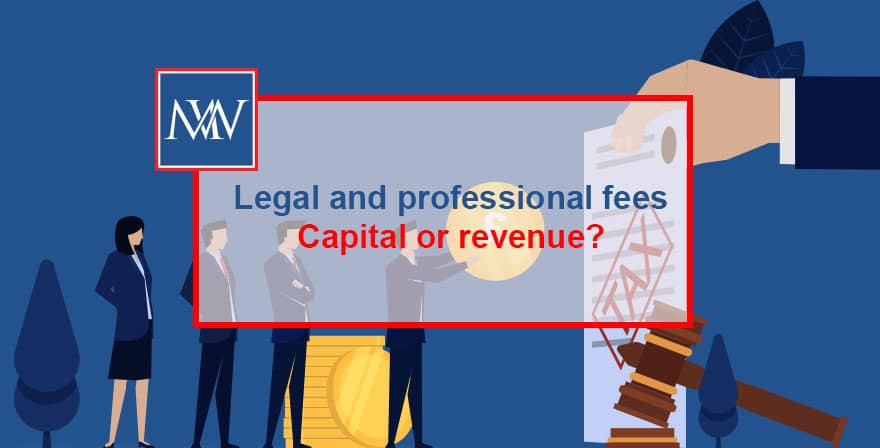
Legal and professional fees – Capital or revenue?
As a property investor and landlord, you will likely incur various legal and professional fees during owning and operating your rental properties. Properly distinguishing between capital and revenue expenses is crucial for tax purposes.
The landlord must also determine whether the costs are revenue or capital in nature. The rules also differ depending upon whether the accounts are prepared on a cash basis or using traditional accounting under the accruals basis.
The rule
The nature of legal and professional fees follows the underlying matter to which they relate
-
- Fees tied to revenue items are also treated as revenue
- Fees tied to capital items are treated as capital
- Examples:
- Legal fees to recover unpaid rent (revenue)
- Legal fees related to a property purchase (capital)
Cash or accruals basis
The deduction of revenue items in computing profits remains consistent regardless of whether the cash or accruals basis is employed. However, the timing of the relief may differ. Under the cash basis, the deduction is granted for the period that correlates with the expenditure. On the other hand, the accruals basis allows for the deduction to be given for the period in which the expenditure is incurred. This divergence in timing results in distinct advantages depending on the chosen accounting method.
This difference in timing provides distinct advantages depending on the chosen accounting method.
Check Also BANK HOLIDAYS IN THE UK, YEAR 2024
For capital expenditure, different rules apply. No deduction is allowed for capital expenditure under the accrual basis, whereas under the cash basis, the treatment depends on the nature of the item – capital expenditure is deductible under the cash basis unless the expenditure is of a type for which a deduction is expressly forbidden. Items of the forbidden list include expenditure in or in connection with lease premiums and the provision, alteration or disposal of land (which includes property).
Examples of allowable revenue items
Legal and professional fees will generally be treated as revenue expenses if they pertain to:
- costs of obtaining a valuation
- normal accountancy costs incurred in preparing accounts of the rental business and agreeing on the tax liabilities
- costs of arbitration to determine the rent
- the costs of evicting an unsatisfactory tenant to re-let the property
Common Capital Expenses
The following are examples of legal and professional fees which are capital in nature:
- legal costs incurred in acquiring or adding to a property
- costs in connection with negotiations under the Town and Country Planning Act
- fees incurred in pursuing debts of a capital nature, such as the proceeds due on sale
- Drafting leases lasting over 1 year (including stamp duty)
- Paying lease renewal premiums
Leases warrant special attention given the unique tax treatment of associated legal fees:
- Initial Letting Expenses: Fees related to the first long-term lease (over 1 year) are treated as capital expenses. This includes:
- Legal fees for drafting the lease
- Surveyor fees
- Letting agent commissions
- Lease Renewals: Legal fees related to lease renewals are revenue expenses unless the renewed lease exceeds 50 years.
- Costs attributable to lease premiums paid are not deductible
- Consecutive Short Leases: Expenses from consecutive short-term leases (under 1 year) to multiple tenants can still qualify as revenue items.
- However, a long lease replacing a short lease triggers capital treatment
The Impact on Taxable Rental Profits
Properly classifying legal and professional fees is crucial for accurately calculating your taxable rental income:
- Revenue expenses are fully tax-deductible in the year paid/incurred
- Capital expenses do not reduce taxable rental profits, though they may qualify for other tax relief options like capital allowances
Meeting with an accountant can help review your individual situation to maximize available deductions and tax planning.
Turning Expenses Into Assets
With careful planning, certain legal and professional fees can be transformed from mere expenses into tangible assets that improve your rental portfolio:
- Development planning permissions
- Long-term lease arrangements
- Property upgrades and renovations
Explore strategic possibilities with your advisors. Investing in lasting property improvements can raise rents, lower vacate rates, and increase capital values over time.
Summary Table: Capital vs Revenue Fees
| Type of Fee | Capital or Revenue? |
|---|---|
| Property purchase conveyancing | Capital |
| Rent collection proceedings | Revenue |
| Obtaining rental valuations | Revenue |
| Pursuing unpaid sales proceeds | Capital |
| Drafting initial long leases | Capital |
| Lease renewals (under 50 years) | Revenue |
| Evicting non-paying tenants | Revenue |
| Adding rental properties to the portfolio | Capital |
| Development planning applications | Capital |
For more information about Legal and professional fees – Capital or revenue?, Book a free consultation
Our Offices
Makesworth Accountants in Harrow
Cervantes House, 5-9 Headstone Road,,
Fax: 020 7183 5320
Email: info@makesworth.co.uk
Need Accountancy Support?
For information on bespoke training, or if you have any other questions for Makesworth Accountant, please fill in your details below
















 151
151